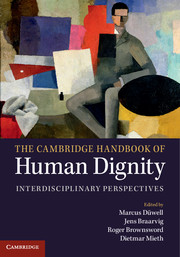Book contents
- Frontmatter
- Contents
- List of contributors
- Foreword
- Why a handbook on human dignity?
- Acknowledgments
- 1 Human dignity from a legal perspective
- 2 Human dignity: concepts, discussions, philosophical perspectives
- Part I Origins of the concept in European history
- Part II Beyond the scope of the European tradition
- Part III Systematic conceptualization
- Part IV Legal implementation
- Part V Conflicts and violence
- Part VI Contexts of justice
- 51 Human dignity and social welfare
- 52 Dignity and global justice
- 53 Human dignity and people with disabilities
- 54 Human dignity as a concept for the economy
- 55 Human dignity and gender inequalities
- 56 The rise and fall of freedom of online expression
- Part VII Biology and bioethics
- Appendix 1 Further reading
- Appendix 2 Universal Declaration of Human Rights
- Index
- References
56 - The rise and fall of freedom of online expression
from Part VI - Contexts of justice
Published online by Cambridge University Press: 05 March 2015
- Frontmatter
- Contents
- List of contributors
- Foreword
- Why a handbook on human dignity?
- Acknowledgments
- 1 Human dignity from a legal perspective
- 2 Human dignity: concepts, discussions, philosophical perspectives
- Part I Origins of the concept in European history
- Part II Beyond the scope of the European tradition
- Part III Systematic conceptualization
- Part IV Legal implementation
- Part V Conflicts and violence
- Part VI Contexts of justice
- 51 Human dignity and social welfare
- 52 Dignity and global justice
- 53 Human dignity and people with disabilities
- 54 Human dignity as a concept for the economy
- 55 Human dignity and gender inequalities
- 56 The rise and fall of freedom of online expression
- Part VII Biology and bioethics
- Appendix 1 Further reading
- Appendix 2 Universal Declaration of Human Rights
- Index
- References
Summary
At first glance, the connection between human dignity and technology is a tenuous one. We strive to see ourselves as autonomous subjects, uncontrolled by the everyday technology around us. Often technology is promoted as being the very basis for increased freedom. Access to the Internet is increasingly seen as the basis for democratic participation, mobile telephone technology is marketed as increasing our freedom and mobility, and social media are presented as a cornerstone for access to knowledge and the antidote to the authoritarian state. Therefore, personal technology, or access to the Internet, has come to symbolize a democratic cornerstone: a realm wherein the individual may engage in public discourse and access information vital to personal development and necessary for true democratic participation. This is particularly true for most of the digital technology that has come to dominate much of the public discourse: for example, the mobile phone, the Internet and social networks.
In recognition of its role in freedom of expression, individual autonomy and development and recognizing its value in social participation and democratic participation, a discussion has arisen as to whether access to the Internet should be made into a right: whether states have the responsibility to guarantee that Internet access is broadly available. Several countries have enacted measures to protect individuals’ access to the Internet (Lucchi 2011).
- Type
- Chapter
- Information
- The Cambridge Handbook of Human DignityInterdisciplinary Perspectives, pp. 505 - 514Publisher: Cambridge University PressPrint publication year: 2014
References
- 1
- Cited by



